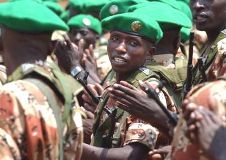Rwandan president visits Sudan’s Darfur, inspects troops
By MOHAMED OSMAN, Associated Press Writer
KHARTOUM, Sudan, Feb 23, 2005 (AP) — Rwandan President Paul Kagame on Wednesday visited Sudan’s troubled Darfur region to inspect 130-plus Rwandan troops participating in the African Union force trying to monitor a shaky cease-fire in the violence.
 Kagame, who has drawn parallels between the Darfur bloodshed and his country’s 1994 genocide, el-Fasher, capital of North Darfur state, where he met with Rwandan soldiers and senior Sudanese government officials.
Kagame, who has drawn parallels between the Darfur bloodshed and his country’s 1994 genocide, el-Fasher, capital of North Darfur state, where he met with Rwandan soldiers and senior Sudanese government officials.
Kagame and his Sudanese counterpart, Omar el-Bashir, held talks late Tuesday during which the Rwandan leader offered his nation’s support to end the two-year Darfur conflict, which has killed more than 70,000 people since March and displaced more than 2 million from their homes.
“Rwanda should work side by side with Sudan to settle the situation in Darfur, given her (Rwanda’s) vast experience in ending conflicts and boosting peaceful coexistence and social accord,” Sudan’s state-run news agency quoted Kagame, who is on a three-day visit, as saying.
El-Bashir said his government was committed to ending the Darfur conflict, which started after rebels from the vast region’s ethnic African tribes took up arms, complaining of discrimination by the Arab-dominated government in Khartoum.
A pro-government Arab militia, called the Janjaweed, launched a counterinsurgency in which thousands have been killed.
“Sudan and Rwanda are linked by bonds of geography and the common concern for the realization and boosting of peace and stability (for their respective countries),” el-Bashir was quoted as telling Kagame.
“We are determined to find a solution and extinguish the fire of sedition in Darfur, which some foreign quarters seek to fan.”
The United States has accused the Sudanese government and the Janjaweed of genocide and the United Nations has suggested the use of sanctions to end the violence.
Sudan has allowed African Union observers, backed by AU soldiers, deploy to Darfur to monitor two cease-fire agreements reached between the government and the rebels. But the deals have been often broken.
The Sudanese government, which has come under intense U.S.-led international pressure to end the violence, stresses that the conflict should be resolved within the African Union’s mandate. The government said that talks between rebels and the government are expected to resume by the end of February.
El-Bashir said the determination that resulted in the Jan. 9 peace treaty signing to end the 21-year civil war in southern Sudan should “guide us into reaching the same noble goal in the states of Darfur.”
Kagame on Wednesday met with his nation’s troops plus Darfur tribal leaders and senior Sudanese government officials. The Rwandan leader also visited the Salam Camp outside el-Fasher where thousands of Sudanese displaced by the violence now live.
Osman Mohamed Yusuf Kibir, the governor of North Darfur state, described the Rwandan leader’s visit as “successful.”
“We met and discussed the role of the African Union and how important it was that the Darfur file should remain within the AU,” Kibir said in telephone call from el-Fasher.
During commemorations last year of the 10th anniversary of the Rwandan genocide, many observers said that the international community moved too slowly to prevent thousands of deaths in this central African country, and called for quicker and more decisive action on Darfur.
Kagame also has drawn parallels, saying last August as the Rwandan troops prepared to join the peacekeepers: “Our forces will not stand by and watch innocent civilians being hacked to death like the case was here in 1994.”
In Rwanda, more than 500,000 minority Tutsis and political moderates from the Hutu majority were killed in a campaign involving government troops, Hutu militia and villages organized by an extremist Hutu government. The genocide ended when then-rebels led by Kagame captured the Rwandan capital, Kigali, and ousted the extremist government on July 4, 1994.
